 W
WMihajlo Apostolski was a Yugoslav general, military theoretician, politician and historian. He was commander of the Headquarters of the National Liberation Army and Partisan detachments of Macedonia, colonel general of the Yugoslav National Army (JNA), and was declared a People's Hero of Yugoslavia.
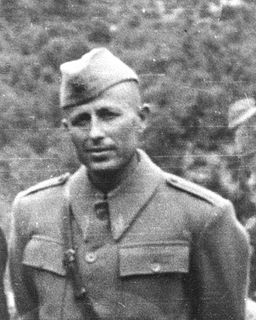 W
WMitar Bakić, was a Yugoslav politician, general and People's Hero of Yugoslavia. During World War II, he was political commissar of the 4th Montenegrin brigade, 2nd Proletarian Division and 2nd Corps. After the war, he was the chief of staff of Josip Broz Tito, secretary-general of the Yugoslav government and member of Yugoslav mission in United Nations. He also had rank of reserve lieutenant general of Yugoslav People's Army.
 W
WMilan Basta was a Yugoslav World War II general, a member of the Partisan Movement and a publicist. Croatian Serb, he was born in 1921 in Kurjak, a village in Lika – a region in today's Croatia. He attended grammar school in Zagreb, Croatia where he joined the League of Communist Youth of Yugoslavia (SKOJ) in 1939. In 1941 he became a member of the Communist Party of Croatia. After joining the Yugoslav Partisans, he participated actively in the preparation of the uprising against the German occupier. During the liberation war in Yugoslavia he was appointed political commissar of the “Krbava” battalion, 2nd Lika Detachment and 3rd Lika Proletarian Brigade. He was the head of the political department of the 20th division and 12th Vojvodina Brigade. In 1945 he performed the duty of the political commissar of the 51st Vojvodina Division which took part in the battles at the Yugoslav-Austrian border.
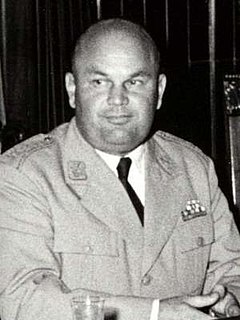 W
WJanko Bobetko was a Croatian general who had participated in World War II and later in the Croatian War of Independence. He was one of the founding members of 1st Sisak Partisan Detachment, the first anti-fascist military unit during World War II in Yugoslavia. He later had a military career in the Yugoslav People's Army (JNA).
 W
WZorko Čanadi was a general of the Yugoslav People's Army (JNA).
 W
WPetar "Peko" Dapčević was a Yugoslav communist who fought as a volunteer in the Spanish Civil War, joined the Partisan uprising in Montenegro, and became commander of the Yugoslav 1st Proletarian Corps, 1st and 4th Armies.
 W
WMilovan Djilas ; 12 June 1911 – 20 April 1995) was a Yugoslav communist politician, theorist and author. He was a key figure in the Partisan movement during World War II, as well as in the post-war government. A self-identified democratic socialist, Djilas became one of the best-known and most prominent dissidents in Yugoslavia and all of Eastern Europe.
 W
WPetar Drapšin was a Yugoslav Partisan commander.
 W
WDušan Kveder was a Yugoslav soldier and diplomat from Slovenia who served in a number of official capacities during and after the Second World War, including a term as Military Commander of the Free Territory of Trieste and as the Yugoslav ambassador to Ethiopia, West Germany, India, and the United Kingdom. He was made a People's Hero of Yugoslavia in 1952.
 W
WIvan Gošnjak was a Yugoslav communist who held numerous important offices in Yugoslavia during and after World War II, serving as the Minister of Defence from 1953 to 1967.
 W
WPetar Gračanin was a Yugoslav and Serbian politician and general in the Yugoslav People's Army.
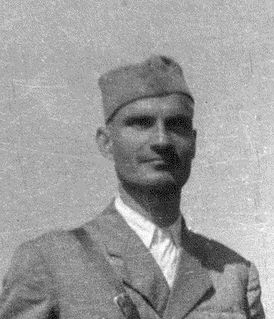 W
WArsenije "Arso" Jovanović was a Yugoslav partisan general and one of the country's foremost military commanders during World War II in Yugoslavia.
 W
WJovan "Jovo" Kapičić, born Jovan Kapa, was a Yugoslav General and post-war politician.
 W
WNinoslav Krstić was a Serbian general who served as Commander of Joint Security Force during Insurgency in the Preševo Valley
 W
WNikola Ljubičić was the President of the Presidency of Serbia (1982–1984), a member of the Presidency of the Socialist Federal Republic of Yugoslavia (1984–1989), and the Minister of Defence of Yugoslavia (1967–1982). He received numerous medals both from Yugoslavia and abroad, including the Order of the National Hero of Yugoslavia.
 W
WIvan Milutinović was a Yugoslav Partisan general and an eminent military commander who participated in World War II.
 W
WRatko Mladić is a Bosnian Serb convicted war criminal and colonel-general who led the Army of Republika Srpska (VRS) during the Yugoslav Wars. In 2017, he was found guilty of committing war crimes, crimes against humanity, and genocide by the International Criminal Tribunal for the former Yugoslavia (ICTY).
 W
WMilutin Morača was a Yugoslav partisan, general of Yugoslav People's Army and People's Hero of Yugoslavia. His brother Pero, was historian and also a partisan.
 W
WKonstantin "Kosta" Nađ was a Yugoslav Partisan Army general that fought during World War II.
 W
WGojko Nikoliš was a physician, historian and a participant in the Spanish Civil War and World War II in Yugoslavia.
 W
WIzidor Papo was a surgeon, general, military medical chief and academician.
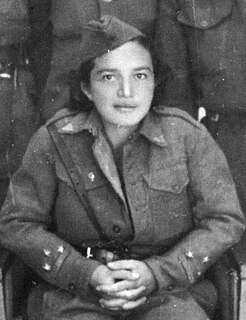 W
WRoza Papo (1914–1984) was a Bosnian Jewish physician and general of the Yugoslav People's Army. She was the first woman to rise to the rank of general on the Balkan Peninsula.
 W
WNebojša Pavković is a Serbian retired army general who served as Chief of the General Staff of the Armed Forces of Yugoslavia from February 2000 to June 2002. He also served as the Commandeer of Third Army of the Armed Forces of Yugoslavia during the Kosovo War, from December 1998 to February 2000.
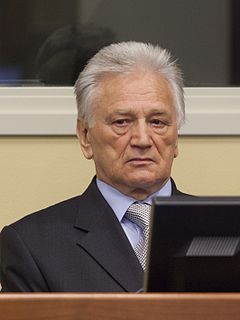 W
WMomčilo Perišić is a Serbian former general who served as the Chief of the General Staff of the Armed Forces of Yugoslavia between 1993 and 1998.
 W
WKonstantin "Koča" Popović was a Yugoslav politician and communist volunteer in the Spanish Civil War, 1937–1939 and Divisional Commander of the First Proletarian Division of the Yugoslav Partisans. He is on occasion referred to as "the man who saved the Yugoslav Partisans", because it was he who anticipated the weakest point in the Axis lines on the Zelengora–Kalinovik axis, and devised the plan for breaking through it during the Battle of Sutjeska, thus saving Tito, his headquarters and the rest of the resistance movement. After the war, he served as the Chief of the General Staff of the Yugoslav People's Army, before moving to the position of Foreign Minister and spent the final years of his political career as the Vice President of Yugoslavia.
 W
WVladimir Popović Lukin, also known as Vlado Popović, was a Yugoslav diplomat, politician, general, revolutionary, close associate to Josip Broz Tito. He was, during his career, a delegate to the UN, close associate of Josip Broz Tito, Yugoslavia's envoy (ambassador) to the USSR, US, China, and Vietnam, member of the federal government of Yugoslavia, and chair of the Committee for Foreign Affairs of the Federal Assembly of Yugoslavia, and secretary to the presidency until his death in 1972.
 W
WSlavko Rodić, was a Yugoslav partisan, general of Yugoslav People's Army and People's Hero of Yugoslavia.
 W
WIvan Rukavina was army general of the Yugoslav People's Army, People's Hero of Yugoslavia and politician.
 W
WMartin Špegelj was a Croatian army general and politician who served as the second Defense Minister of Croatia and, later, the chief of staff of the newborn Croatian army and inspector-general of the army. His efforts to organize and equip the army from scratch were seen as instrumental in helping Croatia survive the first year of the Croatian War of Independence. Partly owing to disagreements with president Franjo Tuđman, he retired in 1992, after the war froze with the permanent ceasefire at the end of 1991.
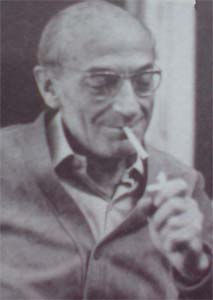 W
WStjepan Steiner was Croatian physician, cardiologist, Major general in the Yugoslav People's Army and personal physician of Josip Broz Tito.
 W
WVelimir Terzić was a Yugoslav partisan, general of Yugoslav People's Army and historian. Prior to World War II, he was captain of Royal Yugoslav Army. After Yugoslav defeat in April War, he joined Montenegrin partisans and took part in 13 July Uprising. In 1943 he was chosen for deputy of general Arso Jovanović, chief of partisan Supreme HQ. After World War II, he remained in Yugoslav People's Army and had many roles. He was deputy of Minister of Defense, head of Military Academy, chief inspector of Yugoslav People's Army. He retired from the army in 1955 and became head of Military History Institute.
 W
WFranjo Tuđman, also written as Franjo Tudjman, was a Croatian politician and historian. Following the country's independence from Yugoslavia he became the first President of Croatia and served as president from 1990 until his death in 1999. He was the 9th and last President of the Presidency of SR Croatia from May to July 1990.
 W
WAnton Tus is a retired Croatian general who served as head of the Yugoslav Air Force between 1985 and 1991 and was the first Chief of Staff of the Croatian Armed Forces from 1991 to 1992 during the Croatian War of Independence.
 W
WVeljko Vlahović was a Montenegrin member of the Yugoslav Communist Party from 1935. He studied in Belgrade, Prague, and the Sorbonne, and finished his postgraduate studies in Moscow. He fought in the Spanish Civil War and was active in organizing the Communist Youth League of Yugoslavia (SKOJ). During World War II he directed the Free Yugoslavia radio. In 1944 he became editor of the Yugoslav communist daily, Borba. He also served as deputy Foreign Minister.